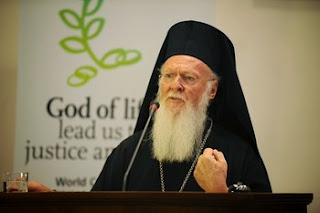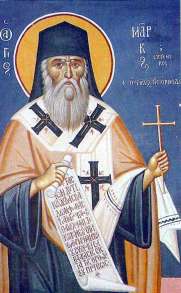экуменизм
Патриарх Варфоломей на заседании ВСЦ на о. Крит
Ο Πατριάρχης Βαρθολομαίος στη συνεδρίαση του ΠΣΕ στην Κρήτη

Обращаясь к членам ВСЦ, весьма умным протестантам, патриарх Варфоломей, во время заседанияя Центральной Комиссии ВСЦ в Православной Академии на о. Крит, произнес слово. В своей речи он привел слова из послания апостола павла к Титу: «Титу, истинному сыну по общей вере: благодать , милось и мир от Бога Отца и Господа Иисуса Христа, Спасителя нашего» (Тит. 1, 4).А апостол Павел, обращаясь же к Титу хотел говорить об «общей вере». Какова же эта «общая вера» Патриарха Варфоломея и членов ВСЦ? В своем слова патриарх Варфоломей, указывая лишь на такие этические моменты общей веры как собода, благочестие, стремление к справедливости в мире, уходит от раскрытия таких важных и ключевых понятий в послании апостола павла, раскрывающей понятие о есдинстве в вере как «говорить сообразно со здравым учением». Понтие быть «в здавой вере» включает по мыли Святых Отцов две стороны — читота догматов и чистота жизни, нравов (свт. Амвросий Медиланский, свт. Иоанн Златоуст,свт. Феофан Затворник). Именно первое патриарх не раскрывается вообще, хотя апостолл Павел в 3-й главе этого же послания касается наиважнейшего вопроса — отношения к еретикам, то есть искажающим апостольскую веру, каковыми являются как протестанты, так и римо-католики. Этой темы, харнения истинной веры апостол Павел касается, опысывая качестве епископа: «Ибо епсикоп должен быть непорочеи, как Божий домостроитель, не дерзок, не гневлив..., целомудрен, справедлив, благочестив, воздержан, держащийся истинного учения слова, согласного с учением, чтобы он был силен и наставлять в здравом учении и противящихся обличать» (Тит.1, 7-9). Свт. Феофан, опираясь на свт. Иоанна Златоуста и других Отцов комментаоров Священно Писания, подчеркивает — епископ должен и проповедовать слово истины, ибо это его главная обязанность, но прежде всего он должен «дорожить словом истины как самой жизнью». В понимании патриаха Варфоломея «общая вера» это некий набор определенных морально-этических качеств человека и не более. Вопрос о чистоте веры им не не поднимается вообще, словно апостол Павел об этом и не упоминает. Поэтому эта речь Вселснкого патриарха лишена всякого свидетельства инославным о Православии, как едиинственной Апсотольской Церкви.
Предлагаем прочесть всю речь Патриарха предложенную на английском языке:.
ADDRESS By
His All-HolinessEcumenical Patriarch
BARTHOLOMEWTo the Central Committee of the World Council ofChurches
(Orthodox Academy, Crete, September 3, 2012)
Beloved friends in the Lord,We are sincerely delighted to be here with you as grateful beneciaries of the generous hospitality of the historical Church of Crete.
It is through the “fair havens” (the Kaloi Loimenes ) of thisapostolic island that St. Paul, the great “apostle to the gentiles,”sailed on his way to Rome on his 4 th missionary journey, leaving behind Titus as its rst bishop ad his trusted colleague.We are also pleased that you are convening here at the beautiful Orthodox Academy of Crete, this precious gem of theEcumenical Patriarchate that combines theoretical exploration andpractical application. This institution has a long, proven record of integrating theological study and ecumenical witness. Yourpresence here during these days conrms this tradition.Moreover, we were deeply honored by the kind invitation toaddress you as distinguished members of the Central Committeeof the World Council of Churches and spontaneously accepted to
1
subsume this signicant meeting under the auspices of theEcumenical Patriarchate for the second time. The rst such blessedoccasion was in Heraklion, Crete, almost 45 years ago.The commitment of the Ecumenical Patriarchate to the visionand mission of the World Council of Churches – from the earlyformative and creative years through even the more difcult andcontentious moments – has always been unwavering andparamount. Indeed, our own admiration and dedication to theservice and ministry of the World Council of Churches is amplyevident in our extensive participation in numerous executive rolesand responsibilities over many decades. In more recent years, onthe occasion of the 60 th anniversary of the WCC, we addressed the Central Committee in Geneva in 2008; on these very grounds, wespoke to the plenary of the Faith and Order Commission in 2009;and we communicated a message via video to the InternationalEcumenical Peace Convocation held in Jamaica last year.Given all this, we would like to bring to your attention threeconcepts highlighted in the Apostle Paul’s Letter to Titus thatpertain to the sub-themes of your forthcoming 10 th General Assembly next year in Busan, South Korea, which comprises ahumble prayer that the “God of Life [may] lead us to justice andpeace.”Life is God's gift to humankind and to all creation. It is a giftthat emerges from the Trinitarian love and God’s love for theworld. The Father loves the Son, while the Holy Spirit strengthensthis divine love among the three persons and toward the world. According to the Church Fathers, this gift of life is the result of
God’s mystery as Father and “Maker of all things, both visible andinvisible.” Creation on the other hand has to live in the fullness of freedom and in pursuit of justice and peace. When humanity experiences such freedom and justice, then it realizes the pre-guration of God’s Kingdom and the anticipation of the divinetransguration.Turning, then, to St. Paul’s Letter to Titus, we observe thatthe rst concept concerns St. Paul’s advice to “teach what betssound doctrine.” (2.1)
Life Together in Faith: Unity and Mission
is therst sub-theme of the General Assembly in Korea. This is a clearreminder of the foundation of our unity and mission as anecumenical body. For we must at all times remember – alwaysreminding ourselves and respectfully reminding others – that weconstitute a fellowship of churches that confess the Lord JesusChrist as God and Savior, ultimately seeking and under nocircumstances neglecting our calling to visible unity in one faith“that the world may believe.” (John 17.21) We must be careful that,again in the inspired words of Paul to Titus, “in everything wemay adorn the doctrine of God our Savior” (2.10) and that “theword of God is not discredited.” (2.5)The second concept relates to St. Paul’s recognition that“truth accords with godliness” (1.1), that authentic “peace comesfrom God” (1.4), and that “the grace of God has appeared for thesalvation of the whole world.” (2.11)
Life Together in Hope: For Justice, Peace and Reconciliation in the World
is the second sub-themeof the upcoming General Assembly. “Godliness” implies doing theright thing by all people and by all of God’s creation; it involveshonoring and upholding the rights of every person as well as of
every living creature. Our doctrine and tradition should informour life and spirituality; our creed should conform to our worship;or, to adopt the language of the programs of the World Council of Churches, our “faith” should complement our “order.”Finally, the third sub-theme of next year’s General Assemblyis
Life Together in Love: For a Common Future
. There is a key termthat appears in chapter 1, verse 8, of Paul’s Letter to Titus. Theword is
philoxenos
, which signies “hospitable.” The bishop – or,we could expand this to include every faithful Christian and,indeed, every “lover of goodness” (1.8) as “God’s steward” (1.7) –is called to be both gracious and generous, kind andaccommodating. The expression philoxenos literally designatessomeone who loves strangers. It denotes someone who is not intolerant and exclusive of those who are different or appearforeign. It is the welcoming and embracing of the other – the every other, regardless of religion, race, ethnicity, color, creed and gender– in whom we are to envisage the unique and living image of God.It is the antithesis of racism and xenophobia. We must strive toovercome eastern and western divides of cults and cultures; wemust struggle to heal northern and southern divides of peoplesand countries.Dear friends, our prayers are with you as you prepare toorganize an Assembly that will proclaim a new message andvision for the years ahead. We also pray for all those involved inthese preparations – the members of the Central Committee, theSecretary General, the Assembly Planning Committee under theleadership of His Eminence Metropolitan Gennadios, and eachmember of the Committee and Staff, as well the Korean Host
4
Committee – so that the WCC member Churches and the entireecumenical family may experience a peaceful and festiveAssembly.We are called to invoke and embrace God’s justice and peace.If we resist justice and peace, then we are instruments of evil in theworld. In some ways, the theme of next year’s Assembly – “God of life, lead us to justice and peace” – is diametrically opposed to thepetition in the Lord’s Prayer that God may “lead us not intotemptation, but deliver us from evil.”Permit us to close with words from St. Paul’s Letter to Titus:“My beloved children in our common faith, may the grace andpeace of God the Father and Christ Jesus our Savior … be with youall. Amen.” (Titus 1.4 and 3.15)
http://thriskeftika.blogspot.com/2012/09/blog-post_7411.html

